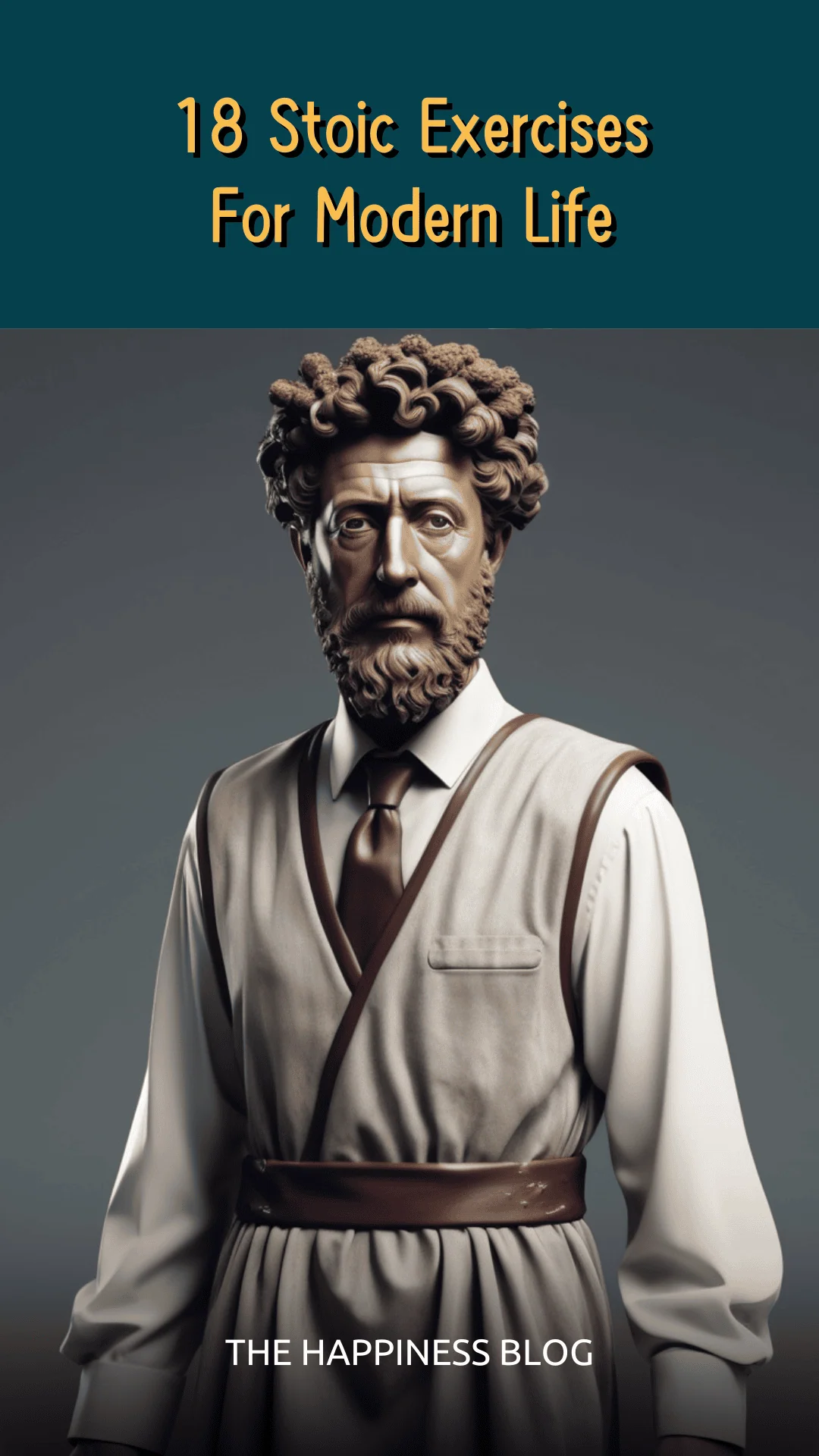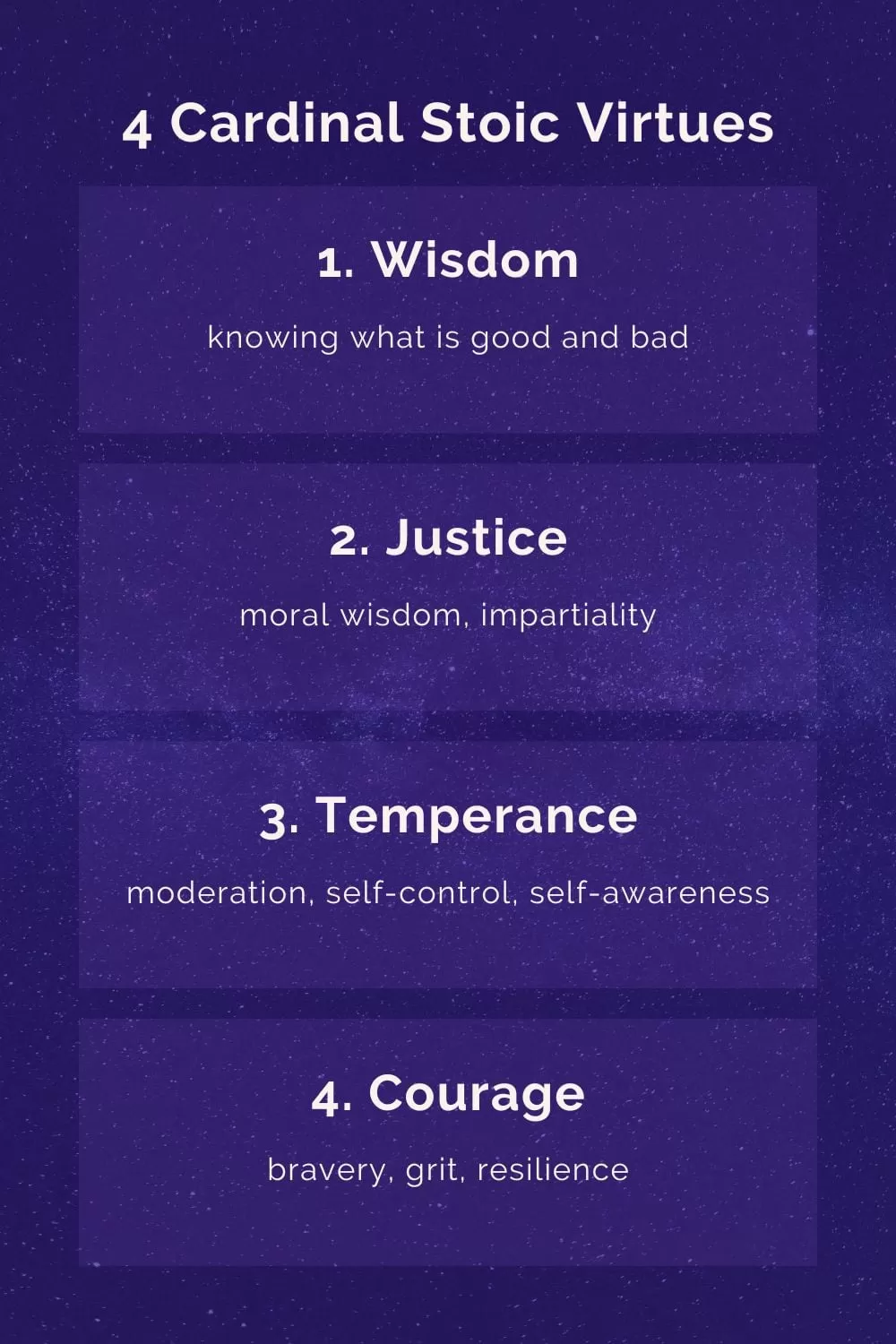Today's Monday • 25 mins read
It was a shipwrecked dye merchant who founded Stoicism.
Zeno of Citium was a Phoenician merchant whose ship sank near the Athenian port of Piraeus. He survived. And never left Athens after that.
At that time, Athens was home to some of the greatest thinkers. For 20 years, Zeno studied under various philosophers. In 301 BCE, he finally launched Stoicism.
Stoicism was and is a practical guide for people on how to live satisfied lives without regrets.
Anyone can practice being Stoic without leaving the necessities or amenities of modern life. This list of 18 Stoic exercises, based on my 10+years of Stoicism study, may help you feel calm and organized in a chaotic and uncertain modern life.
Start with just one exercise a day. When you practice more of these every day, you become more of a Stoic. Of course, being a Stoic is a lifelong process.
How To Practice Stoicism: 18 Stoic Exercises For Modern Life
Let’s begin.
1. Make a Stoic affirmation
Start your day with this Stoic affirmation:
I don’t and can’t control events outside me.
I can only control how I respond to them.
Repeat the affirmation a few times while looking at yourself in the mirror. It is a simple 10-second ritual.
You may not feel a change right away, but within a few weeks, you start to think and act like a Stoic.
Then, when something unexpected happens, you act where you can, then let it go. You don’t carry its burden like a personal cloud over your head.
Say, your laptop fails. It’s inconvenient, but getting angry won’t solve it, and it will only weigh on you for the rest of the day. So, fix what you can, ask for help, or find a temporary workaround.
Remind yourself,
I don’t and can’t control events outside me. I can only control how I respond to them.
- That affirmation helps you mark bold lines between outside events and your judgments about them—and discarding the latter.
- It helps you to stop your emotional surges from deciding things for you. You stay calm when things go wrong. You get better at accepting without reacting, and then, doing what you must.
- You stop trying to control others. Your mental peace becomes your priority over telling others what they should not do or say.
Psychologists agree with these Stoic principles about emotions:
- All emotions are natural, and therefore welcome; what’s not welcome is our irrational behavior driven by those intense emotions.
- What upsets us mostly is our interpretation of an event, not the actual event.
Epictetus said it tersely:
It’s not things that upset us but rather our opinions about them.
— Epictetus, Enchiridion, 5
And again:
Man is disturbed not by things, but by the views he takes of them.
— Epictetus, a Stoic master
2. Keep the end in mind
The Stoics kept the finiteness of life in mind at all times. That awareness stopped them from wasting time and pushed them to be honest and good, as if every action might be their last chance.
This practice, called memento mori, reminded them they could not escape an ending, no matter how famous, wealthy, or powerful.
So they aimed to live with humility and moral purpose: avoiding hubris, not taking undue advantage of others, and not postponing what should be done today.
That awareness stopped them from wasting time. It pushed them to be honest and good, as if every action might be their last chance.
That tradition, called memento mori, reminded them that they could not escape the end, no matter how famous, wealthy, or powerful.
So they aimed to live with humility and moral purpose, avoiding hubris, not taking undue advantage of others, and not postponing what should be done today.
Marcus Aurelius put it plainly:
“You could leave life right now. Let that determine what you do and say and think.”
— Meditations 4.17 / 10.29
And Seneca wrote to Lucilius:
“Let us prepare our minds as if we’d come to the very end. Let us postpone nothing. Let us balance life’s books each day… The one who puts the finishing touches on their life each day is never short of time.”
Stoics held that fear of the end underlies other fears; by confronting “ultimate” fear, we free ourselves from many attachments and anxieties.
One Stoic formulation runs: “You may take everything from me except my virtues for the days I have left.”
Read the 21 Unforgettable Stoic Quotes On Life’s End.

3. Eat as a Stoic would
The Stoic practice was to eat sparsely. They followed Socrates’ idea of eating to live, not living to eat.
Musonius Rufus (30-95 CE), one of the four great Stoic philosophers of the Roman Empire, and the man who taught Epictetus, held that controlling one’s appetite is at the foundation of self-control.
Rufus taught his followers that they should prefer foods that are modestly priced, easy to come by, and healthful to eat. His idea was not to spend too much time either shopping for or making food.
Rufus asked them to avoid eating slaughtered animals, and instead, sustain on grains, fruits, vegetables, milk, honey, cheese, and the like.
He also advised against overeating and eating mindlessly or hurriedly. He frequently reminded the Stoics to eat in moderation, with self-control, and with mindfulness.
The person who eats more than he should makes a mistake. So does the person who eats in a hurry, the person who is enthralled by gourmet food, the person who favors sweets over nutritious foods, and the person who does not share his food equally with his fellow diners.
— Musonius Rufus, Lecture 18.4
Zeno, the first Stoic, tried to subsist on whatever he could eat uncooked. Mostly, he ate only small loaves and honey.
Zeno thought it was best to avoid gourmet and fancy food, as they spoiled one’s appetite.
Once people develop a taste for fancy foods, they get triggered to crave expensive, uncommon, and hard-to-get foods. And then they lose their ability to enjoy simple foods.
Even Marcus Aurelius (read his most inspiring quotes here), the powerful Roman emperor and the last great Stoic of antiquity, seemed to eat sparsely. In one of his letters, he wrote:
Then we went to luncheon. What do you think I ate? A wee bit of bread, though I saw others devouring beans, onions, and herrings full of roe. We then worked hard at grape-gathering, and had a good sweat, and were merry and, as the poet says, still left some clusters hanging high as gleanings of the vintage.
— Marcus Aurelius to Fronto (144 – 145 CE), The Correspondence of M. Cornelius Fronto
- So, why not try fasting today? A modern way of fasting is Intermittent Fasting (IF). In this, you keep a gap of 14 to 16 hours between the last meal of your day and the first meal of the next day. IF has some proven biological benefits.
- Another thing you could do is this: When you eat your food today, make it a point to chew it for a long time. Note the taste of every morsel as if you can taste each particle. This is mindful eating.
- One last idea on the Stoic way of eating: Try sitting with the food you know is unhealthy for you. Just sit there for a long while. Don’t eat it. Think deeply about why you should not eat it, and how it would harm you later. Then trash it, however alarming that idea may seem — drop it into the trash can.

4. Work at your own worth
Do you fix your worth based on what others think of you? (Actually, that’s precisely what narcissists do.)
As a practicing Stoic, it doesn’t matter if others admire, like, hate, or laugh at you.
Even if they love you, they might not think as much about your goals and dreams as you do.
And when they dislike you, of course, they would not care about your values and strengths of character.
They will never understand who you actually are. So, why steer your life based on what their views are about you?
Instead, why not work to raise your own worth? Why not turn to yourself and grind out excellent quality at whatever you do, rather than working to win their validation?
You don’t have to have a royal bounty as your target to pursue work that raises your worth.
You can choose one little piece of work today and give it your best focus, skills, and dedication. What this would do is discipline you for a higher level of personal excellence.
Just 90 minutes a day on a single task gets you 900 minutes of self-confidence and self-worth in a month.
Stoic principles warn that your material possessions, however high-priced, will lose their shine after a while. Then you would start taking them for granted. They would be as good as forgotten.
The same holds for people as well. Do not resent others for having what you do not own.
Your time and your moral values are your real possessions.
Trying to live a life chasing the same things as they have is a slippery slope toward anxiety and misery.
Work to achieve your goals, but without seeking approval or applause from others.
That is how children of narcissistic parents turn out — constantly fearful and striving to please their parents at great personal costs.
Turn your focus on being as virtuous as you can with what you control — your thoughts and actions.
Work on building your own worth using the tools you have. To flourish, let go of what is not helping your growth, and get a better grip on what sharpens your skills.
Seneca sagely advised,
“Every night, before going to sleep, we must ask ourselves: What weakness did I overcome today? What virtue did I practice?”
You do not need to judge yourself because someone else did so.
You do not have to slot yourself into a certain category because everyone else has checked in there. Stand on your own and fix your self-worth.
And you always have the option to have no opinion about anything.

5. Write a journal to yourself
Marcus Aurelius (121-180 CE), the Roman emperor, wrote a journal by hand, most of it during the last decade of his life. He continued writing even while commanding Roman military campaigns at the front.
Surprisingly, Marcus may have wanted the journal destroyed after he passed away. Ancient sources, such as the Historia Augusta, and later biographers claim he wrote Meditations as a private journal and gave instructions not to publish it.
Despite that, the work was preserved, and thankfully so, since we now have it as the book Meditations.
Writing a journal was a widespread daily Stoic habit, and Marcus Aurelius was the most powerful Stoic to have ever walked this earth.
- The Stoic way of journaling was to write in the morning about the things they wanted to do that day.
- Then, at night, they came back to it and analyzed how their day went against how they wanted it to go.
The Stoics wrote to bring order to their thoughts, ideas, and memories. Writing for themselves helped them view problems more objectively and find practical solutions, especially in hard times.
It reminded them to act with virtue, correct mistakes, practise appropriate responses to difficult situations, and examine their conduct.
Epictetus (55-135 CE) also journaled. He wrote, “These are the things [the distinction between what one can and cannot control] which philosophers should meditate on, which they should write daily, in which they should exercise themselves.”
So did Seneca: “I examine my entire day and go back over what I’ve said and done, hiding nothing from myself, and passing nothing by.”
Do you know about the Stoic shortcut to thinking clearly and deciding quickly?
6. Detach yourself and practice Amor Fati
Epictetus and Marcus Aurelius wrote on the Stoic idea of accepting one’s destiny.
Later, it came to be known as Amor fati, a Latin phrase that translates as the love of one’s fate or passionate acceptance of everything in one’s life.
It was Nietzsche, the revolutionary philosopher, who gave the phrase to the world:
My formula for greatness in a human being is amor fati: that one wants nothing to be different, not forward, not backward, not in all eternity. Not merely bear what is necessary, still less conceal it—all idealism is mendacity in the face of what is necessary – but love it.
— Nietzsche
Amor Fati is not about trying to erase anything from the past. Rather, it is about accepting the past wholeheartedly—both the good and the bad, all the failures and the successes.
Amor Fati means doing the most that we can, putting in our best efforts to make the world a better place, without worrying about what results from our practices, and accepting the outcomes with gratitude and strength.
Amor fati is loving your fate without leaving your goals. It is accepting the present without abandoning the future.
When we worry, we mostly think of an expected outcome. We get anxious that the future might unfold in a way we do not imagine it. But can we really control all parts of the results? No.
As we embrace the Stoic philosophy of Amor Fati, we embrace our future, our fate, whatever it may be.
But it does not mean to be nihilistic (nothing is going to be worthwhile) or pessimistic (expecting the worst).
Amor fati means working towards what you mean to and intend to do without attaching yourself to the results. It is to accept the outcome, whatever it is, as you can only control the process, not what it throws up in the end.
“Don’t demand that things happen as you wish; rather, wish that they happen as they do happen: then you will be happy.”
— Epictetus, Enchiridion
The Stoics believed the entire cosmos was organized rationally, including the order of events in its entire time. Fighting against this cosmic fate can only cause unhappiness.
The better option was to embrace the result with love, and then work to make the best of it.
Think of amor fati as the process of readying an arrow on a bow:
- Aim at your target with your best technique and balance.
- Do not worry or overthink if your arrow may not reach its target.
- Once you release it, accept wherever the arrow ends up (amor fati).
- At your next attempt, try to improve your methods until the arrow hits the target.

7. Read a passage from a Stoic classic
It is an easy yet powerful exercise to read a passage from a classic book by an ancient Stoic.
You could read a few lines, if not a full passage, from Seneca, Epictetus, Musonius Rufus, or Marcus Aurelius.
For beginners in Stoicism, Marcus Aurelius’ immortal self-reflection journal Meditations is the go-to book. It is easy to read, understand, and keep in memory for the day.
Marcus ascended the Roman throne at 40 years of age, with twenty-odd years of philosophical training and practice behind him. He is rightly called the philosopher-king.
Though he studied Cynicism, Epicureanism, Platonism, and ideas from other schools of philosophy, Marcus is held as the quintessential Stoic.
Marcus Aurelius mostly wrote while he was leading military action against the Marcomanni and other Germanic and Sarmatian tribes during the Marcomannic Wars, in his last decade on earth, between 170 and 180 CE.
Here are a few inspiring passages:
▪ Then make time for yourself to learn something worthwhile; stop letting yourself be pulled in all directions. But make sure you guard against the other kind of confusion. People who labor all their lives, but have no purpose to direct every thought and impulse toward, are wasting their time—even when hard at work. (Meditations, 2.7)
▪ Forget everything else. Keep hold of this alone and remember it: Each of us lives only now, this brief instant. The rest has been lived already, or is impossible to see. The span we live is small—small as the corner of the earth in which we live it. (Meditations, 3.10)
▪ People who are excited by posthumous fame forget that the people who remember them will soon be gone too. And those after them in turn. Until their memory, passed from one to another like a candle make, gutters and goes out. (Meditations, 4.19)
▪ Nothing happens to anyone that he can’t endure. The same thing happens to other people, and they weather it unharmed—out of sheer obliviousness or because they want to display “character.” Is wisdom really so much weaker than ignorance and vanity? (Meditations, 5.18)
▪ If anyone can refute me—show me I’m making a mistake or looking at things from the wrong perspective—I’ll gladly change. It’s the truth I’m after, and the truth never harmed anyone. What harms us is to persist in self-deceit and ignorance. (Meditations, 6.21)
▪ To feel affection for people even when they make mistakes is uniquely human. You can do it, if you simply recognize: that they’re human too, that they act out of ignorance, against their will, and that you’ll both be gone before long. And, above all, that they haven’t really hurt you. They haven’t diminished your ability to choose. (Meditations, 7.22)
My personal favorite is this self-advice from Emperor Marcus Aurelius:
▪ When you wake up in the morning, tell yourself: The people I deal with today will be meddling, ungrateful, arrogant, dishonest, jealous, and surly. They are like this because they can’t tell good from evil. But I have seen the beauty of good, and the ugliness of evil, and have recognized that the wrongdoer has a nature related to my own—not of the same blood or birth, but the same mind, and possessing a share of the divine. And so none of them can hurt me. No one can implicate me in ugliness. Nor can I feel angry at my relative, or hate him. (Meditations, 2.1)
Get yourself a modern translation of one of these books, and make it a point to read yourself a passage from it every morning.
You can do it before you start your day, or before you begin your workday.
Spend a few moments reflecting on the passage. Highlight or underline the passages that inspire you the most and return to them later.
8. Do A Good Act Today
Do a simple good act each day.
It could be any small thing that could make another person benefit from it.
The Stoics maintained that the only thing that contributes to eudaimonia or happiness is Virtue. They kept it clear and strong that doing good for its own sake was the highest virtue of human life.
A Stoic does a good act because it is good to do so. Period.
Living with virtue was the only way to a good life. The four cardinal virtues of Stoicism are:
- Wisdom: knowing between the good and the bad.
- Justice: practicing morality, fairness, impartiality.
- Temperance: moderation, self-control.
- Courage: bravery, grit, resilience.

So, do a friendly act for another person today—carry a meal to a homeless guy, write a thank-you note to the office staff, or take a break to watch a movie with your partner—while expecting no praise.
Now comes the vital bit:
- If you get praised, accept it without the littlest bit of arrogance.
- If you get told off or criticized for doing it, treat their insults with indifference.
Wherever there is a human being, there is an opportunity for a kindness.
— Lucius Annaeus Seneca, Statesman and Stoic philosopher (4 BCE-65 CE)
My advice, as a modern Stoic:
- Be ready to help others.
- Help others without expecting anything.
- But ask them first whether they want your help.
9. Take another person’s perspective
A Sage is a person with perfect wisdom, as the Stoics believed.
The good thing is that the Stoics also held no one can ever be an ideal Sage, as all humans are flawed by nature.
So, what they suggested was to take time to think deeply about what a Stoic Sage would do in a particular situation, and how they would carry themselves.
This was to find the perfect behavior pattern, even when they are imperfect themselves, and emulate it. This was to get over the biased logic of “my way of doing things” and do what the Sage would do.
When faced with a difficult issue, do not act until you have answered the question, “What would Marcus do in this situation?”
It can be a quick guide to living a good life and making virtuous decisions. With this, you do the right thing, whether or not anyone is watching.
Marcus Aurelius says,
“When a man has done you wrong, immediately consider with what opinion about good or evil he has done wrong. For when you have seen this, you will pity him, and will neither wonder nor be angry. For either you yourself think the same thing to be good that he does or another thing of the same kind. It is your duty then to pardon him. But if you do not think such things to be good or evil, you will more readily be well disposed to him who is in error.” (Meditations 7.26)
10. View from above
The idea of The View From Above appeared in many schools of thought but featured remarkably in Stoicism.
In this, a Stoic imagines they are seeing things from high above, as if from the sky or a high mountain. It serves to remind us how tiny we are and how minuscule our problems are in the vastness of the cosmos.
It changes our perspective from being narrowly focused on our anxieties to looking at our issues on a cosmological scale.

Marcus Aurelius mentioned it several times in his Meditations.
“You can rid yourself of many useless things among those that disturb you, for they lie entirely in your imagination; and you will then gain for yourself ample space by comprehending the whole universe in your mind, and by contemplating the eternity of time, and observing the rapid change of every part of everything, how short is the time from birth to dissolution, and the illimitable time before birth as well as the equally boundless time after dissolution.” (Marcus Aurelius, Meditations 9.32)
11. Speak little and speak well
The Stoics favor remaining silent over speaking out whatever comes to mind. When we listen to a person, we should do only this: Listen.
We should not jump to offer them our opinion, point out their mistakes, or offer a similar story from our lives. Our silence serves them better than our unasked-for advice.
People who were actively listened to, as researcher Harry Weger Jr. found, felt more understood than those who received advice or simple acknowledgments.
Furthermore, those given active listening responses were more satisfied with their talk and thought the listener was more socially attractive.
Don’t talk too much, don’t speak ill of others, don’t speak about what you don’t know. Instead, listen to others mindfully.
Zeno said something that still carries wisdom, “We have two ears and one mouth, therefore we should listen twice as much as we speak.”
Ryan Holiday writes, “The Stoics knew how damaging our words could be if we said the wrong thing too often. It’s why Zeno, Marcus Aurelius, Seneca, and Epictetus all wrote about the importance of well-thought-out speech.”
Epictetus said of this,
“Be for the most part silent, or speak merely what is necessary, and in few words. We may, however, enter, though sparingly, into discourse sometimes when occasion calls for it, but not on any of the common subjects, of gladiators, or horse races, or athletic champions, or feasts, the vulgar topics of conversation; but principally not of men, so as either to blame, or praise, or make comparisons. If you are able, then, by your own conversation bring over that of your company to proper subjects; but, if you happen to be taken among strangers, be silent.” (Enchiridion XXXIII.2)
Beware → Don’t speak less of others for having their share of praise and fortune. If you cannot applaud them freely, then you must also not whine about how little of those things you have in your own life.
12. Acknowledge other people’s virtues
People are basically good. Believe it and live by it.
Marcus Aurelius says of this:
“Whenever you want to cheer yourself up, consider the good qualities of your companions, for example, the energy of one, the modesty of another, the generosity of yet another, and some other quality of another; for nothing cheers the heart as much as the images of excellence reflected in the character of our companions, all brought before us as fully as possible. Therefore, keep these images ready at hand.” (Meditations, 6.48)
13. Speak without judging
Our judgments assault the person we are speaking to. Even if we do not use judgmental words in our conversation, our tone and nonverbal expressions reveal our intentions.
Epictetus says of this,
“Does anyone bathe in a mighty little time? Don’t say that he does it ill, but in a mighty little time. Does anyone drink a great quantity of wine? Don’t say that he does ill, but that he drinks a great quantity. For, unless you perfectly understand the principle from which anyone acts, how should you know if he acts ill? Thus you will not run the hazard of assenting to any appearances but such as you fully comprehend.” (Enchiridion XLV)
14. Meditate on the cosmos in the morning
Marcus Aurelius says,
“The Pythagoreans say, ‘Look at the sky at dawn’ — to remind ourselves of the constancy of those heavenly bodies, their perpetual round of their own duty, their order, their purity, and their nakedness. No star wears a veil.” (Meditations 11.27)
15. Deal with mishaps as if they happened to others, not you
Epictetus says of this,
“The will of nature may be learned from those things in which we don’t distinguish from each other. For example, when our neighbor’s boy breaks a cup, or the like, we are presently ready to say, “These things will happen.” Be assured, then, that when your own cup likewise is broken, you ought to be affected just as when another’s cup was broken. Apply this in like manner to greater things. (Enchiridion XXVI)
16. Remind yourself of the impermanence of things
Epictetus says,
“With regard to whatever objects give you delight, are useful, or are deeply loved, remember to tell yourself of what general nature they are, beginning from the most insignificant things. If, for example, you are fond of a specific ceramic cup, remind yourself that it is only ceramic cups in general of which you are fond. Then, if it breaks, you will not be disturbed. If you kiss your child, or your wife, say that you only kiss things which are human, and thus you will not be disturbed if either of them dies.”(Enchiridion III)
17. Respond to insults with humor
A Stoic is not an emotionless person, as many misconstrue, but rather someone who is not ruled by their emotions. So, when someone insults them, even though they feel hurt, they won’t return hurt to the person who insulted them.
Epictetus says,
“If anyone tells you that such a person speaks ill of you, don’t make excuses about what is said of you, but answer: “He does not know my other faults, else he would not have mentioned only these.”” (Enchiridion XXXIII.9)
18. Apply virtue to every situation
This is the central axis of Stoicism, and Stoics live every day by this principle: Virtue.
A Stoic is nothing if not a person of virtue. They believe that one’s true earnings in life are what one gets through integrity and virtue.
Stoics always do the right thing and be honest, whether observed or not.
As C. S. Lewis said much later, “Integrity is doing the right thing, even when no one is watching.”
Epictetus says,
“With every accident, ask yourself what abilities you have for making a proper use of it. If you see an attractive person, you will find that self-restraint is the ability you have against your desire. If you are in pain, you will find fortitude. If you hear unpleasant language, you will find patience. And thus habituated, the appearances of things will not hurry you away along with them.” (Enchiridion X)
Final Words
Stoicism started on the streets. Many of its teachers taught their students in the Agora — a marketplace with people moving around buying and selling things.
When a Stoic master preached, a commoner passing by would stop for a few minutes and listen to a part of the lecture before getting back to their business. Thus, Stoicism became more a way of daily life than a subject in elite classrooms.
And so it has remained through the ages, 2300 years later.
5 Simple Ways To Practice Stoicism
- Remind yourself that nothing lasts forever, whether fame, fortune, or life.
- Don’t try to control what other people think and speak about you.
- Practice amor fati — accept what happens without complaining.
- Don’t judge others, even if they judge or treat you harshly.
- Do the right thing, whether you’re watched or not.
“Stoicism doesn’t demand perfect knowledge to practice it. Anyone can stop by and read or listen to a few words of Stoic wisdom in between going about their business.” — Anon
√ Also Read: Dichotomy of Control: Stoic Peace For Modern Problems
√ Please share this with someone.
» You deserve happiness! Choosing therapy could be your best decision.
...
• Disclosure: Buying via our links earns us a small commission.


